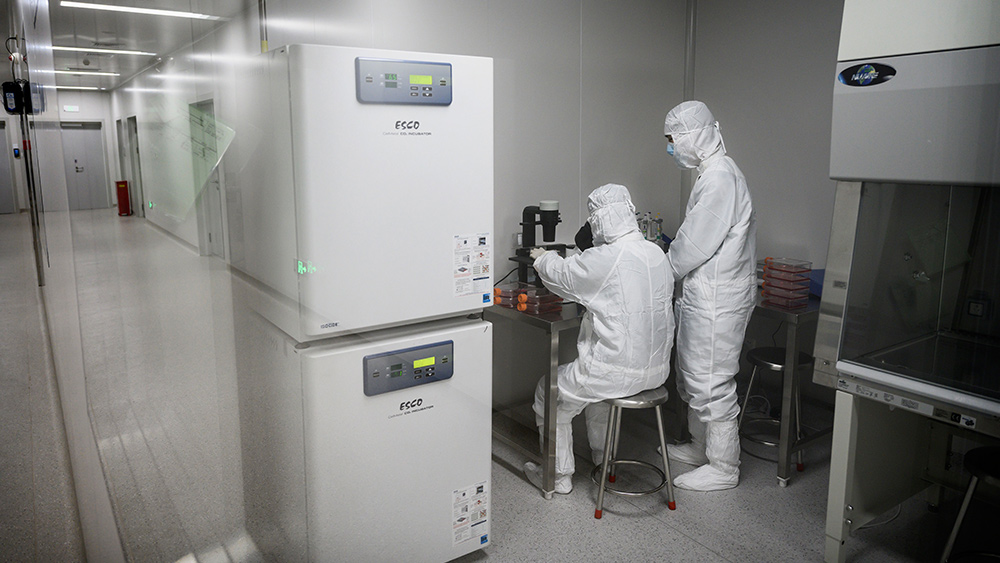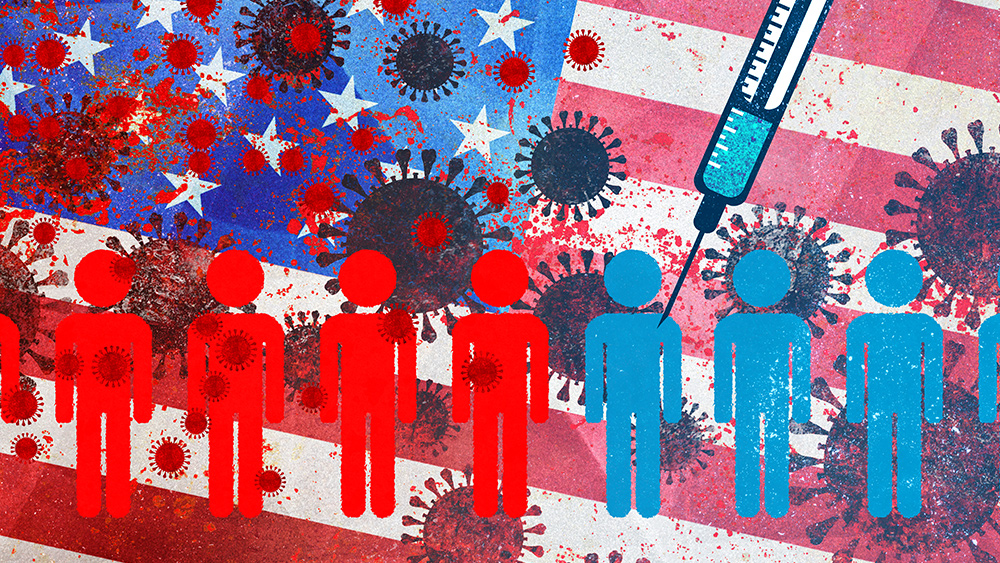Gray Lady’s sad decline: New York Times shills for pharma under guise of ‘fact checking’
01/25/2021 / By News Editors

The corporate media’s use of questionable “fact checkers” to shape and censor information isn’t new, though the practice has reached new heights during the pandemic. CHD’s recent encounter with the New York Times is a perfect example.
(Article republished from ChildrensHealthDefense.org)
For many reasons, 2020 is likely to go down in history as a major turning point.
But one of the year’s most disturbing trends was the consolidation of an increasingly ruthless censorship regime intent on tightly controlling discussion about the coronavirus and related topics.
Outright bans on information can be rather clumsy. So the mainstream media — and the media’s corporate and military-intelligence handlers — also had relied on “soft censorship” last year, using “fact checkers” to play whack-a-mole with persons and organizations who raised questions about officialdom’s COVID-19 story and the pandemic response.
Fact checking had been gaining momentum as a “circular feedback loop of verification” to “shape and censor information” well before 2020. But those shepherding the coronavirus narrative have taken the practice to new heights.
As early as last April, journalist Matt Taibbi described how the mainstream media were dismissing anyone who questioned COVID-19 as “expertise deniers.” Taibbi chronicled the preference among media fact checkers for “authoritative” opinions to the exclusion of independent or less well-known sources.
This is a risky bias, Taibbi wrote, because “Authorities by their nature are untrustworthy. Sometimes they have an interest in denying truths, and sometimes they actually try to define truth as being whatever they say it is.”
Children’s Health Defense’s (CHD) recent encounters with the New York Times’ fact-checking maneuvers provide a perfect case in point.
Conflating facts with ‘misinformation’
On Dec. 16, 2020, the New York Times published a barely restrained hit piece, written by Davey Alba and Sheera Frenkel, in which the reporters branded several individuals as “misinformation peddlers.”
Among other statements, the two journalists took CHD Chairman Robert F. Kennedy, Jr. to task for alleging an “unproven” link between ingredients in Pfizer’s COVID-19 vaccine and anaphylactic reactions experienced by two British recipients of the vaccine.
After the Pfizer vaccine’s launch in the U.S., there were immediately more reports of allergic reactions.
In their vaguely worded slur, the Times reporters made no mention of the fact that UK experts, according to Reuters, had rapidly pinpointed polyethylene glycol (PEG) as the likely cause of the allergic reaction experienced by the UK healthcare workers who received the vaccine.
PEG, a stabilizer used in a process called “pegylation,” is present in both the Pfizer and Moderna coronavirus vaccines.
Nor did the reporters disclose that Alba had contacted CHD staff one day previously. In her Dec.15 email, Alba said she was open to receiving “more context” about statements made by Kennedy and CHD about PEG. However, in their article, Alba and Frenkel made no mention of PEG.
Kennedy and CHD began raising questions about PEG well before the Pfizer and Moderna vaccines’ emergency use authorization in the U.S. and the UK’s parallel go-ahead for the Pfizer jab. These questions were aired in an early August article on CHD’s website, and in extensively referenced letters to the Department of Health and Human Services (HHS), Dr. Anthony Fauci, and the U.S. Food and Drug Administration (on August 26 and September 25), and in additional articles and social media posts.
Willful ignorance
In her email to CHD, Alba asserted that PEG’s dangers had been “debunked in at least one fact-check article.” The fact-checking organization she referenced is the London-based charity Full Fact.
Though Full Fact bills itself as “independent,” its top funders include Facebook, Google and Luminate (founded by the eBay-financed Omidyar Group), a typical donor profile for what The Corbett Report has called the “murky world of information gatekeeping.”
Full Fact brags about its work pioneering automated fact checking and “charitable” activities that include going into schools to tell students “how to spot misinformation.”
The Full Fact post referenced by Alba tackled the following statement about PEG, pulled from unspecified websites:
“The mRNA vaccines from BioNTech/Pfizer contain polyethylene glycol (PEG). 70% of people develop antibodies against this substance — this means that many people can develop allergic, potentially fatal reactions to the vaccination.”
The scientific source for that statement is an easily findable and frequently cited peer-reviewed study published in 2016 in Analytical Chemistry, which found anti-PEG antibodies in approximately 72% of contemporary human samples.
Anti-PEG antibodies are a well-studied phenomenon, as evidenced by the fact that a PubMed search for “anti PEG antibodies” brings up over 32,000 results. Nevertheless, Full Fact concluded, “We could find no evidence for the 70% figure the websites claim.”
When CHD President Lyn Redwood highlighted the 2016 study in a detailed response to Alba — after Alba had invited CHD to provide “a response to the fact check” — Alba chose to ignore it.
In her email to Alba, Redwood also included the following:
- Information about the conclusions of the 2016 study, which stated that anti-PEG antibodies, so alarmingly ubiquitous, “have been associated with reduced efficacy of and/or adverse reactions to therapeutics modified with or containing PEG.”
- A copy of CHD’s Sept. 25 letter to the FDA.
- Links to two follow-up articles published by CHD in early December (here and here) following UK scientists’ acknowledgment of the plausible connection between the vaccines’ inclusion of PEG and post-vaccination anaphylaxis.
In addition, Redwood furnished Alba with a link to a Dec. 14 CHD press release containing CHD’s strong recommendation (first articulated in the August and September letters to HHS, Dr. Fauci, and the FDA) to screen patients for anti-PEG antibodies prior to administering PEG-containing vaccines.
When Alba asked Redwood to “distill” CHD’s response “into a one- or two-sentence format,” Redwood emphasized this critical point — that the FDA should require pre-screening of all mRNA vaccine recipients for anti-PEG antibodies and for drug allergies, as well as requiring monitoring of allergic and autoimmune reactions. However, in the Times article, the two reporters made no mention of CHD’s crucial recommendation to screen for anti-PEG antibodies specifically, instead stating only that Kennedy had called for “pre-screening” and then claiming that “regulators have already said they would do so.”
In actuality, the FDA and those administering vaccines have pointedly ignored CHD’s urgent recommendation, despite an admission from the director of FDA’s Center for Biologics Evaluation and Research (CBER) that PEG “could be a culprit” in the allergic reactions observed to date.
An HHS/FDA/CBER document issued in January 2019 even explicitly recognized the need to “adequately understand the risk of anti-drug antibodies … in products with modifications such as pegylation.”
Making up for the FDA’s lack of regulatory zeal, some researchers are now recommending a series of screening questions that include asking patients whether they have a history of severe allergic reactions to injectable medications, other allergens, prior vaccines or PEG — and “If people answer a certain number of questions in the affirmative, they should be skin-tested for PEG. If they test positive for that, they shouldn’t get one of the new vaccines.”
The chorus of cautions grows
As of early January, according to the Epoch Times, 1,156 individuals had reported adverse events related to COVID-19 vaccines to the Vaccine Adverse Event Reporting System (VAERS). The events reported include 308 emergency room visits, 17 “life-threatening” incidents and two individuals permanently disabled.
According to the Centers for Disease Control and Prevention (CDC), 5,052 healthcare workers self-reported serious “health impact events” using a smartphone app called v-safe within the first five days of the Pfizer vaccine’s rollout — these were adverse events requiring care from a fellow health professional and rendering the person unable to work or perform normal daily activities.
Five days after the Times’ carefully crafted dismissal of Kennedy’s and CHD’s concerns as “unproven,” Science magazine published an article discussing scientists’ widening “suspicions” that the PEG compound in Pfizer’s COVID-19 vaccine might be triggering “rare allergic reactions.” By then, the official number of Pfizer vaccine recipients who had experienced “severe allergy-like reactions” had risen to at least eight.
According to Science, which cited much of the same evidence included in CHD’s articles and letters — including the very same 2016 study that estimated that up to 72% of people have anti-PEG antibodies — “PEGs were long thought to be biologically inert, but a growing body of evidence suggests they are not.”
In December, the CDC updated its “interim clinical considerations for use of mRNA COVID-19 vaccines currently authorized in the United States.” The reformulated guidance advises clinicians to consider a history of “immediate allergic reaction of any severity” to any mRNA COVID-19 vaccine component — including PEG — as a “contraindication to vaccination with both the Pfizer-BioNTech and Moderna COVID-19 vaccines.”
The updated CDC guidance also highlights as a contraindication a history of “immediate allergic reaction of any severity to polysorbate (due to potential cross-reactive hypersensitivity with the vaccine ingredient PEG).”
Will the New York Times now attack Science magazine and the CDC for being “misinformation peddlers?”
Read more at: ChildrensHealthDefense.org
Tagged Under: Big Pharma, corporate media, fact checkers, Gray Lady, Journalism, lies, msm, New York Times, NYT, propaganda
RECENT NEWS & ARTICLES
NYTwatch.com is a fact-based public education website published by NYTwatch Features, LLC.
All content copyright © 2018 by NYTwatch Features, LLC.
Contact Us with Tips or Corrections
All trademarks, registered trademarks and servicemarks mentioned on this site are the property of their respective owners.




















